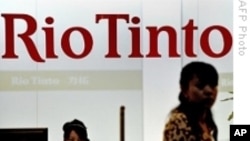Business leaders are hopeful that Australia's fraught diplomatic ties with China, its second biggest trading partner, are stabilizing after months of trouble. Relations soured when Stern Hu, a senior Australian mining executive, was arrested by Chinese official in July. Tensions worsened when an exiled Uighur leader whom Beijing accuses of terrorism was allowed to visit Australia.
<!-- IMAGE -->Commercial ties are important
The sound of mining equipment means money in Australia, which for years has served as been China's quarry. Iron ore is the main component of trade between these Asia-Pacific partners, along with copper, nickel, liquefied natural gas and coal.
Before the global economic slowdown, China's appetite for resources propelled Australia's economy to unparalleled heights. That insatiable demand is almost certain to return when the recovery moves into full swing.
Zhang Junsai, the Chinese ambassador to Australia, says the bilateral relationship is underpinned by these important commercial ties.
"Trade and investment have strengthened the link and trust between our two countries, and between our two peoples," he said.
Diplomatic relations strained
Diplomatic relations, though, have been strained in recent months. China's arrest in July of Stern Hu, an Australian mining executive involved in iron ore negotiations, on suspicion of stealing commercial information has unsettled a once cozy friendship.
Tensions were aggravated further when Australia granted a visa to Rebiya Kadeer, an exiled leader of China's Uighur community. Beijing considers her a terrorist and blames her for violent ethnic clashes in its Xinjiang province.
There have also been commercial strains; Chinese attempts to buy a major stake in Anglo-Australian mining giant Rio Tinto were thwarted, and a proposed investment in a resources project near a strategic military site was turned down.
The divisions that these failed bids created prompted the general manager of the Foreign Investment Review Board, which overseas international acquisitions of Australian assets, to make a rare public appearance.
Chinese investments important for Australia
Patrick Colmer says Chinese investment in Australia is of great importance.
"In 2007-08 it was ranked number six in the Foreign Investment Review Board's statistics," he explained. "In 2008-09 we haven't finally completed the data yet, but it looks as though China will be number three after the United States and United Kingdom, and it's probably going to go higher than that in future years."
In the past year-and-a-half the review board has approved scores of Chinese investments, worth around $31 billion.
Trade between the partners is now worth $60 billion a year, much of it in favor of Australian mining companies.
Yet gold mining executive Kevin Hobgood-Brown says doing business with the Chinese can be difficult. His company has been trading with China since the mid-1990s.
"It's a society in the midst of change," he explained. "As I mentioned earlier the bureaucracy has changed a lot over the last 30 years, and this means that there's experimentation with policy. Often times there's not a lot of detail about a particular policy, or how a law or regulation will be implemented. This creates a certain amount of ambiguity, and you have just got to work through that."
Can relationship withstand pressure?
Foreign affairs analysts, though, believe the Sino-Australian trade relationship can withstand the current political problems.
Richard Rigby is from the Australian National University's China Institute.
"I think overall Australia is still very well perceived in China, and I was in Beijing last week, and talked to a number of interlocutors," he explained. "We didn't pretend there weren't issues that arose, but everyone stressed how important both countries were, the one to the other."
Foreign Minister Stephen Smith has said that ties with China need "to be managed in a careful, cautious, sensible way", although some experts think new irritants could be on the way in the coming months.
In December Tibet's spiritual leader, the Dalai Lama, is scheduled to visit Australia. Beijing considers him a separatist and opposes his visits to other countries. And the trial of arrested mining executive Stern Hu should begin in a few months, which could again raise diplomatic tensions between Canberra and Beijing.





